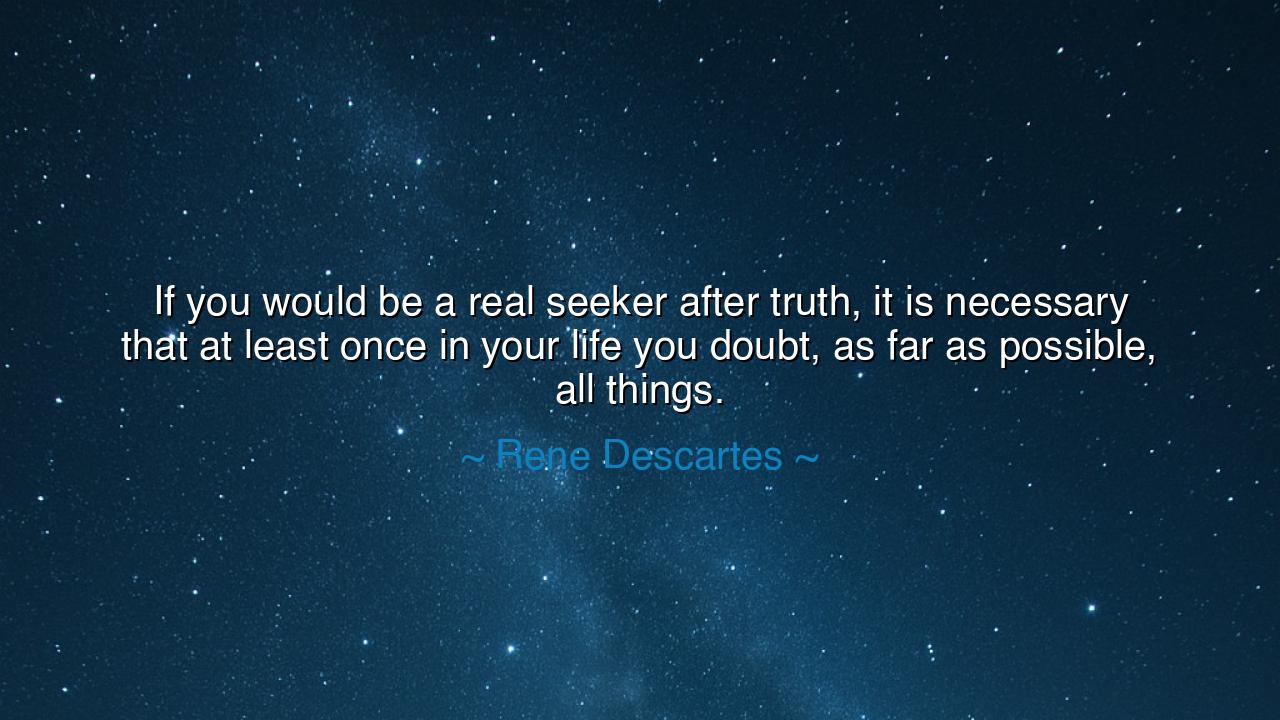
If you would be a real seeker after truth, it is necessary that
If you would be a real seeker after truth, it is necessary that at least once in your life you doubt, as far as possible, all things.






René Descartes, father of modern philosophy, declared: “If you would be a real seeker after truth, it is necessary that at least once in your life you doubt, as far as possible, all things.” These words are not the idle musings of a thinker, but the foundation of a revolution in human thought. Descartes spoke them at a time when the old certainties of church and tradition still weighed heavily upon the mind of Europe. To question, to doubt, was not merely an intellectual exercise—it was an act of courage, a battle cry for freedom of the soul.
In his solitude, Descartes resolved to cast aside every belief, every assumption, every inherited “fact,” until nothing remained but what could not be doubted. He realized that only by dismantling falsehood could he build upon bedrock. Out of this radical doubt was born his immortal insight: cogito, ergo sum—I think, therefore I am. For though he doubted all else, he could not doubt that he was the one doubting. Thus, his quest for truth began not with blind acceptance, but with heroic suspicion.
The ancients themselves, though living long before Descartes, would have recognized the wisdom of this path. Socrates, in the streets of Athens, declared that true wisdom lay in knowing one’s own ignorance. He questioned the powerful, unsettled the comfortable, and forced men to face the limits of their own knowledge. Like Descartes, he knew that truth cannot dwell in a house built on unquestioned foundations. Both men remind us that the seeker must first become a destroyer—tearing down false idols of thought before the temple of wisdom can rise.
History proves the power of this teaching. Think of Galileo, who gazed into the night sky and saw moons circling Jupiter. The truth was before him, yet the world clung to old certainties. His willingness to doubt the doctrines of his age, to question the unmoving Earth, brought forth a new cosmos. For such men, doubt was not weakness—it was the fire that revealed truth hidden beneath centuries of error. Without doubt, the human spirit would still be chained in darkness.
Yet Descartes also teaches that doubt is not an end, but a passage. To doubt forever is to wander in emptiness. To doubt once, as he says, “at least once in your life,” is to cleanse the mind, to test every stone, and then to build upon what endures. Just as the blacksmith plunges metal into fire to strengthen it, so must the seeker plunge his beliefs into the flames of doubt. What survives is stronger, sharper, and closer to truth.
The lesson is this: if you would be free, you must dare to question. Do not live on borrowed certainties. At least once, strip your mind bare of inherited beliefs, and ask, “What do I truly know?” This will be terrifying, for the mind longs for comfort. But only in that silence, in that emptiness, can the voice of truth be heard.
Practical action flows naturally: when you read, when you listen, when you speak—do not accept blindly. Ask questions. Test your assumptions. Do not be afraid to challenge even the foundations of your own convictions. Yet do not remain forever in destruction; once you have doubted, rebuild upon what cannot be denied. Let your truths be chosen, not imposed.
Thus, remember Descartes’ wisdom: “If you would be a real seeker after truth, it is necessary that at least once in your life you doubt, as far as possible, all things.” It is a call to courage, to honesty, to the noble labor of the mind. To doubt is not to betray truth—it is to prepare the ground where truth may finally take root. And the one who dares this once, even once in a lifetime, will live with eyes truly open.






TANguyen Tuan Anh
I can see how Descartes’ call for radical doubt might be a catalyst for discovering deeper truths, but I wonder if it’s a sustainable approach. Wouldn’t constantly questioning everything become exhausting? Could the pursuit of absolute truth ever be fully realized, or is there always some degree of uncertainty? How do we manage doubt without falling into cynicism or losing our sense of direction in life?
LTLynk Tree
The idea of doubting everything to seek truth is powerful, but it seems overwhelming. What if, in doubting everything, we start doubting ourselves or our ability to know anything? Descartes advocates for complete doubt as a method of reaching truth, but does this approach have limitations? Is there a line between healthy skepticism and the paralysis of overthinking, where we can’t make decisions because we’re constantly questioning the validity of every thought or belief?
NBNhu Bui
I’m fascinated by Descartes' call for complete doubt in the search for truth. I get the idea that doubt is essential for intellectual clarity, but how far should we take it? If we question everything, how do we ever arrive at any conclusions or truths? And what happens if we get stuck in perpetual doubt? At some point, don’t we need to trust something in order to function day-to-day?
NMVu Nhu Mai
Descartes' quote makes me think about the importance of questioning everything in order to find truth. It’s almost like a challenge to strip away everything you’ve accepted as fact, to test the foundations of your beliefs. But is it really possible to doubt everything completely? Could such radical doubt be too destabilizing, or is it necessary for true intellectual growth? How does one begin such a deep process of questioning without losing their sense of reality?